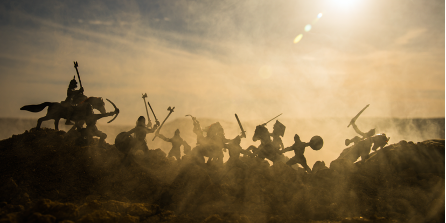
Studying history is typically not viewed as one of the more difficult subjects for students. There are no intricate steps and formulas like the ones found in math and science nor a multitude of grammar rules and procedures as seen in English. So, what’s the struggle with learning and studying history? As most parents typically find, it’s motivation. Most students will make the claim that it has already happened, so why does it matter? Given this, it’s crucial for history students to know why they need to learn the information more than any other subject. Unless they see a “why,” they’ll never be devoted to studying it.
The Two Myths of Why We Should Study History
When providing rationale for why we should study history, most people claim two reasons.
1. It’s interesting.
2. We must learn from it in order to not repeat it.
Unless you’ve been weirdly fascinated and in love with history your entire life like me, saying “history is interesting” is not always true. We all have our likes and dislikes, and some students just don’t find it as appealing as others. If a student finds history interesting already, he or she likely doesn’t need motivation to study it anyway.
We hear often “those who do not learn from history are doomed to repeat it.” While this can be true, it is typically only on a small-scale and is more of process of learning from mistakes rather than the actual avoidance of repeating history. In the end, it is extremely unlikely that history will ever repeat itself—people, governments, ideologies, technology, environments, circumstances, and the world as we know it changes every day.
Student still isn’t motivated? Read on.
So, Why Should We Study History?
Overall, the main reason we should study history is to inform our understanding of the present and create a brighter future. As Americans, we don’t learn about the American Revolution to avoid repeating anything; rather, we study it to understand how the United States came to be what it is today, what principles it was founded upon, and what steps should be taken to promote and improve its ideals. It is also important to study history to honor those who have gone before us who earned the privileges we take for granted today. Men and women like George Washington, Abraham Lincoln, Elizabeth Cady Stanton, Nelson Mandela, and Martin Luther King Jr. went through tumultuous experiences to provide many of the freedoms we enjoy today. By reviewing their lives, we can foster respect for them and take a lesson from their book of perseverance and courage to enhance the future.
Consequences If We Don’t Study History
There are many positive gains associated with studying history, but there are also many negatives that could result if history is not studied. For one, history provides unity. Having a common history creates a collective memory amongst people, and lacking this can cause serious division. Another negative involves the very essence of what history is: a debate. History is just human interpretation; the past is what actually happened. As Winston Churchill stated, “History is written by the victors.” The victors are not always morally right, so it is critical that people continue to question, critique, and argue what is told. History is both a story of humanity and a search for the truth, and if we don’t continue to analyze it, the very soul of mankind will be threatened.
Hungry for More?
If you want to ignite a passion for history in your student, come check us out. Book a private session in history today with any one of our amazing tutors. It’s also not too soon to think about summer, where we will have our awesome, patriotic ‘Merica class complete with Hamilton raps… just you wait.
—by Joshua Ardoin, Studyville History Tutor




